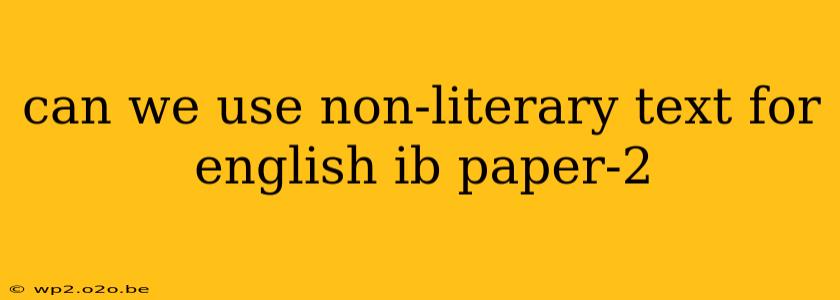Can We Use Non-Literary Texts for English IB Paper 2?
The short answer is: yes, but with careful consideration. IB English Paper 2 allows for a wide range of texts, and while literary texts (novels, plays, poems) are common choices, non-literary texts are absolutely permissible. However, successful analysis of non-literary texts requires a different approach than analyzing literary works.
This article will explore the nuances of using non-literary texts for your IB English Paper 2, outlining the opportunities and challenges involved, and providing strategies for success.
What Constitutes a "Non-Literary" Text?
Non-literary texts encompass a broad spectrum of materials, including:
- Articles: Newspaper articles, magazine features, journal articles (academic or otherwise).
- Speeches: Political speeches, TED Talks, presentations.
- Essays: Opinion pieces, persuasive essays, academic essays (excluding literary criticism).
- Letters: Personal letters, official correspondence, open letters.
- Reports: News reports, scientific reports, government reports.
- Websites & Blogs: Online articles, social media posts (used strategically and with careful consideration of source reliability).
- Images & Visual Media: Photographs, infographics, advertisements (usually in combination with other text).
The key difference between literary and non-literary texts lies in their primary purpose. Literary texts aim to explore themes, characters, and ideas through artistic expression, employing stylistic devices to create a particular effect. Non-literary texts primarily aim to inform, persuade, or instruct, focusing on clarity and direct communication.
Advantages of Using Non-Literary Texts:
- Relevance to Contemporary Issues: Non-literary texts often directly address contemporary issues, allowing for a more immediate and relevant analysis.
- Diverse Perspectives: You can access a wider range of voices and perspectives, exploring how different individuals or groups understand and react to the same events or ideas.
- Demonstrating Analytical Skills: Analyzing non-literary texts requires a different skillset – focusing on rhetorical devices, persuasive techniques, and the construction of arguments – which can showcase your analytical abilities in a unique way.
- Exploration of Language in Context: Non-literary texts demonstrate how language functions in specific social and cultural contexts, offering a fascinating window into the power of language.
Challenges of Using Non-Literary Texts:
- Lack of Literary Devices: The absence of traditional literary devices (metaphor, symbolism, etc.) can make it more challenging to build a complex argument. Focus instead on rhetorical strategies, tone, and the author's implied purpose.
- Establishing Literary Merit: You need to demonstrate the significance of the text and explain why it's worthy of analysis. Choose texts with strong arguments, sophisticated language use, or significant cultural impact.
- Careful Source Selection: Ensure your chosen text is credible and reliable. Avoid using biased or unreliable sources, and always cite your sources properly.
Strategies for Success:
- Focus on Rhetorical Analysis: Analyze the author's use of rhetorical devices (e.g., ethos, pathos, logos, repetition, parallelism) to persuade the audience.
- Examine the Context: Analyze the historical, social, and cultural context surrounding the text to understand its significance.
- Identify the Author's Purpose: Clearly articulate the author's intended purpose and how effectively they achieve it.
- Analyze Language and Style: While literary devices may be less prominent, examine the writer's word choice, tone, and sentence structure to reveal their underlying message.
- Develop a Strong Thesis: Develop a clear and concise thesis statement that focuses on a specific aspect of the text's meaning or effect.
Using non-literary texts for IB English Paper 2 can be a rewarding experience, allowing you to explore contemporary issues and demonstrate your analytical skills in a unique way. However, careful planning, meticulous analysis, and a strong understanding of rhetorical strategies are crucial for success. Remember to consult your teacher and the IB assessment criteria for further guidance.

